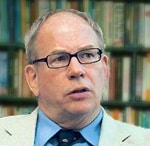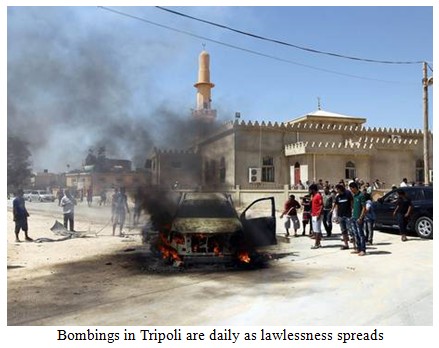Libya in anarchy two years after NATO Humanitarian Liberation
By F. William Engdahl
In 2011 when Muhammar Qaddafi refused to leave quietly as ruler of Libya, the Obama Administration, hiding behind the skirts of the French, launched a ferocious bombing campaign and a “No Fly” zone over the country to aid the so-called fighters for democracy. The US lied to Russia and China with help of the (US-friendly) Gulf Cooperation Council about the Security Council Resolution on Libya and used it to illegally justify the war. The doctrine, “responsibility to protect” was used instead, the same doctrine Obama wants to use in Syria. It’s useful top look at Libya two years after the NATO humanitarian intervention.
Chaos in oil industry
Libya’s economy is dependent on oil. Just after the war, Western media hailed the fact the oil installations were not damaged by the population bombing and oil production was near normal at 1.4 million barrels/day (bpd). Then in July the armed guards hired by the government in Tripoli suddenly revolted and seized control of the eastern oil field terminals they were supposed to protect. There is where the vast bulk of Libya’s oil is produced, near Benghazi. It goes by pipeline to tankers on the Mediterranean for export.
When the government lost control of the terminals production and export fell sharply. Then another armed tribal group seized control of two oilfields in the south blocking oil flow to terminals on the northwest coast. The tribal occupiers demanded more pay and went on strike to demand pay and an end to corruption. The end result is today, early September Libya pumped a mere 150,000 barrels of its capacity of 1.6 million bpd. Exports have fallen to 80,000 barrels per day.[1]
Armed Militias vs Muslim Brotherhood
Libya is an artificial state like much of the Middle East and Africa, carved out in the colonial era of World War I by Italy. It is ruled by tribal consensus among numerous tribes. Qaddafi was chosen in a long process of voting by tribal elders that can take up to 15 years I was told by one expert. When he was murdered and his family hunted, NATO forced rule by a Muslim Brotherhood-dominated National Transitional Council (NTC).
Now in August a new Assembly was elected dominated again by the Brotherhood as in Morsi Egypt or Tunisia. Sounds nice on paper. The reality is that, by all accounts lawless bands, armed for the first time during the war with modern weapons, including foreign Al Qaeda and other jihadists are carrying out daily bombings across the country for local control. Tripoli itself has numerous armed gangs controlling sections of the capitol. It is turning into an armed battle between local tribal millitias that are forming and the Brotherthood that controls the central government. Leaders in the provinces of Cyrenaica and Fezzan are considering breaking away from Tripoli and rebel militias mobilizing across the country. [2]
Nuri Abu Sahmain, Muslim Brotherhood President of the newly elected Congress has summoned militias allied to the Brotherhood to the capital to try to prevent a coup, in a move the opposition sees very much like a coup by the Brotherhood. The main opposition party, a center-right National Forces Alliance, as a result just deserted Congress together with several smaller ethnic parties, leaving the Brotherhood’s Justice and Construction party heading a government with crumbling authority. “Congress has basically collapsed,” said one diplomat in Tripoli. [3] The Obama Administration has promoted a takeover across the Muslim world from Egypt to Tunisia to Syria by the secretive Muslim Brotherhood as part of its long-term strategy of controlling the Muslim Arc of Crisis from Afghanistan to Libya. As the Saudi-backed military coup against Brotherhood president Muhammed Morsi in Egypt in July showed, the Obama strategy has some problems.
Riots and lawlessness
With rising violence the Interior Minister Mohamed Khalifa al Sheikh resigned in August. Some 500 prisoners in Tripoli jail did a hunger strike to protest being held two years without charges. When the government ordered the Supreme Security Committee to restore order, they began shooting prisoners through the bars. In July 1200 prisoners escaped a jail after a riot in Benghazi. In short lawlessness and anarchy is spreading. [4]
Ethnic Berbers, whose militia led the assault on Tripoli in 2011, temporarily took over the parliament building in Tripoli. Because the US and NATO was adamant it wanted no “boots on the ground,” instead they freely gave arms to any and all rebels who would shoot at the Qaddafi government troops. Now they still have the guns and Libya was described to me by one French journalist who had recently been there as “the world’s largest open air arms bazaar,” where for cash anyone can buy any modern NATO weapon.
Foreigners have mostly fled Benghazi since the American ambassador was murdered in the US consulate by jihadi militiamen last September. And Libya’s military prosecutor Colonel Yussef Ali al-Asseifar, in charge of investigating assassinations of politicians, soldiers and journalists, was himself assassinated by a bomb in his car on 29 August.[5]
Prospects are grim as the lawlessness spreads. Sliman Qajam, a member of the parliamentary energy committee, told Bloomberg that “the government is running on its reserves. If the situation doesn’t improve, it won’t be able to pay salaries by the end of the year.”
The Obama Administration argues that the not-yet-proven use by the Assad government of chemical weapons in Syria justifies a bombing war by NATO and allies such as Saudi Arabia, Qatar, Turkey and Jordan, based on the “humanitarian” doctrine deceptively known as “responsibility to protect,” which argues that certain violations of human rights or safety are so serious as to transcend international law, UN Charters or US constitutional requirements and allow on moral grounds any US President to bomb any country he or she chooses. Something is not quite right here. ..
Endnotes:
[1] Krishnadev Calamur, Libya Faces Looming Crisis As Oil Output Slows To Trickle, NPR, September 12, 2013, accessed in http://www.npr.org/blogs/parallels/2013/09/12/221725022/libya-faces-looming-crisis-as-oil-output-slows-to-trickle
[2] Patrick Cockburn, We all thought Libya had moved on it has but into lawlessness and ruin, 3 September 2013, accessed in http://www.independent.co.uk/news/world/africa/special-report-we-all-thought-libya-had-moved-on–it-has-but-into-lawlessness-and-ruin-8797041.html
[3] Chris Stephen, Libyans fear standoff between Muslim Brotherhood and opposition forces, The Guardian, 20 August, 2013, accessed in http://www.theguardian.com/world/2013/aug/20/libya-rebels-muslim-brotherhood-blockade
[4] Patrick Cockburn, op. cit.
[5] Ibid.

Frederick William Engdahl (born August 9, 1944) is an American writer, economics researcher, historian, and freelance journalist.
He is the author of the best-selling book on oil and geopolitics, A Century of War: Anglo-American Oil Politics and the New World Order. It has been published as well in French, German, Chinese, Russian, Czech, Korean, Turkish, Croatian, Slovenian, and Arabic. In 2010 he published Gods of Money: Wall Street and the Death of the American Century, completing his trilogy on the power of oil, food, and money control.
Mr. Engdahl is one of the more widely discussed analysts of current political and economic developments, and his provocative articles and analyses have appeared in numerous newspapers and magazines and well-known international websites. In addition to discussing oil geopolitics and energy issues, he has written on issues of agriculture, GATT, WTO, IMF, energy, politics, and economics for more than 30 years, beginning the first oil shock and world grain crisis in the early 1970s. His book, ‘Seeds of Destruction: The Hidden Agenda of Genetic Manipulation has been translated into eight languages. A new book, Full Spectrum Dominance: Totalitarian Democracy in the New World Order describes the American military power projection in terms of geopolitical strategy. He won a ‘Project Censored Award’ for Top Censored Stories for 2007-08.
Mr. Engdahl has lectured in economics at the Rhein-Main University in Germany and is a Visiting Professor in Economics at Beijing University of Chemical Technology.
After a degree in politics from Princeton University (USA), and graduate study in comparative economics at the University of Stockholm, he worked as an independent economist and research journalist in New York and later in Europe, covering subjects including the politics of energy policy in the USA and worldwide; GATT Uruguay Round trade talks, EU food policies, the grain trade monopoly, IMF policy, Third World debt issues, hedge funds, and the Asia crisis.
Engdahl contributes regularly to a number of international publications on economics and political affairs including Asia Times, FinancialSense.com, 321.gold.com, The Real News, Russia Today TV, Asia Inc., GlobalResearch.com, Japan’s Nihon Keizai Shimbun, Foresight magazine. He has been a frequent contributor to the New York Grant’sInvestor.com, European Banker and Business Banker International and Freitag and ZeitFragen in Germany, Globus in Croatia. He has been interviewed on various geopolitical topics on numerous international TV and radio programs including Al Jazeera, CCTV and Sina.com (China), CCTV (China) Korea Broadcasting System (KBS), and RT Russian TV. He is a Research Associate of Michel Chossudovsky’s well-respected Centre for Research on Globalization in Montreal, Canada, and a member of the editorial board of Eurasia magazine.
Mr. Engdahl has been a featured speaker at numerous international conferences on geopolitical, GMO, economic, and energy subjects. Among them is the Ministry of Science and Technology Conference on Alternative Energy, Beijing; London Centre for Energy Policy Studies of Hon. Sheikh Zaki Yamani; Turkish-Eurasian Business Council of Istanbul, Global Investors’ Forum (GIF) Montreaux Switzerland; Bank Negara Indonesia; the Russian Institute of Strategic Studies; the Chinese Ministry of Science and Technology (MOST), Croatian Chamber of Commerce and Economics.
He currently lives in Germany and, in addition to teaching and writing regularly on issues of international political economy and geopolitics, food security, economics, energy, and international affairs, is active as a consulting political risk economist for major European banks and private investors. A sample of his writings is available at Oil Geopolitics.net
ATTENTION READERS
We See The World From All Sides and Want YOU To Be Fully InformedIn fact, intentional disinformation is a disgraceful scourge in media today. So to assuage any possible errant incorrect information posted herein, we strongly encourage you to seek corroboration from other non-VT sources before forming an educated opinion.
About VT - Policies & Disclosures - Comment Policy




